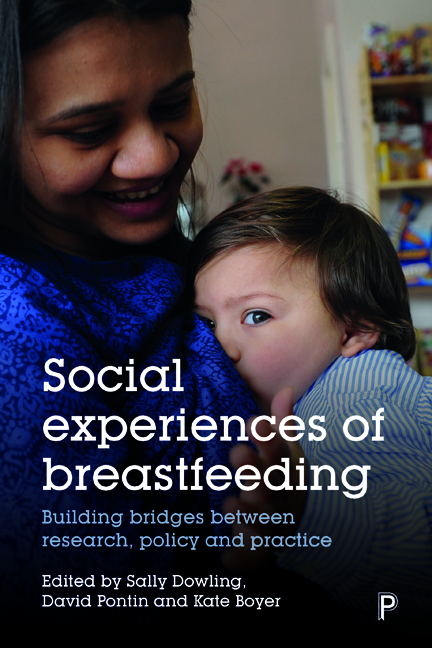Book contents
- Frontmatter
- Dedication
- Contents
- List of tables and figures
- Notes on contributors
- Acknowledgements
- Introduction
- The UK policy context: reconfiguration of the Unicef UK Baby Friendly Initiative to reflect the importance of relationships and ensuring sustainability
- Part I Breastfeeding and emotions
- Part II Cultures of breastfeeding
- Part III Breastfeeding and popular culture
- Conclusion
- Appendix: Schedule for ESRC Seminar Series: Social Experiences of Breastfeeding: Building bridges between research and policy, 2015–16
- Index
nine - Law of lactation breaks in the UK: employers’ perspectives
Published online by Cambridge University Press: 22 April 2022
- Frontmatter
- Dedication
- Contents
- List of tables and figures
- Notes on contributors
- Acknowledgements
- Introduction
- The UK policy context: reconfiguration of the Unicef UK Baby Friendly Initiative to reflect the importance of relationships and ensuring sustainability
- Part I Breastfeeding and emotions
- Part II Cultures of breastfeeding
- Part III Breastfeeding and popular culture
- Conclusion
- Appendix: Schedule for ESRC Seminar Series: Social Experiences of Breastfeeding: Building bridges between research and policy, 2015–16
- Index
Summary
Introduction
After maternity leave, women who return to work may want to breastfeed or express (pump) breast milk for their baby. These lactation breaks may take place during their working time. Line managers are heavily vested in the process of helping parents manage their new roles and the adjustments that must be made in the return-to-work process. While there is no statutory obligation on UK employers to provide lactation breaks to their staff, the cumulative effect of an array of regulations is to make it difficult for an employer to refuse a request for lactation breaks. How do managers understand this complex regulatory system?
In this chapter, I discuss my research into the legal understandings that managers have of this topic. I give a summary of the key legislation applicable in the UK and discuss how this is applied within the workplace. I also reflect upon my findings and give some suggestions for how to improve the legislative backdrop in which women make decisions about their return to work, breastfeeding and how this process can be better managed by employers.
In the project described here, I asked managers, human resources (HR) staff and strategic leaders in a UK public sector organisation about lactation breaks (Fraser, 2016). This investigation shows a real-world context for decision-making around infant feeding. Managers displayed limited knowledge of the legislation and called for goodwill from all parties to resolve issues, better guidance and perhaps legislation on the topic. There were some hesitancies about allowing a baby to visit the workplace, because of lack of suitable facilities, and health and safety issues. My results indicate that better procedures are needed for the process of returning to work as a new parent, and that lactation breaks should be part of that conversation.
Context
The study discussed in this chapter attends to the context of decisions, rather than focusing on women's choices. Employers’ and managers’ views have been studied in the US by other researchers (Stratton and Henry, 2011; Bai et al, 2012; Anderson et al, 2015). UK researchers have investigated the context for lactation breaks by asking women about their experiences (see Kosmala-Anderson and Wallace, 2006; Wallace et al, 2008; Gatrell, 2011).
- Type
- Chapter
- Information
- Social Experiences of BreastfeedingBuilding Bridges between Research, Policy and Practice, pp. 171 - 186Publisher: Bristol University PressPrint publication year: 2018



